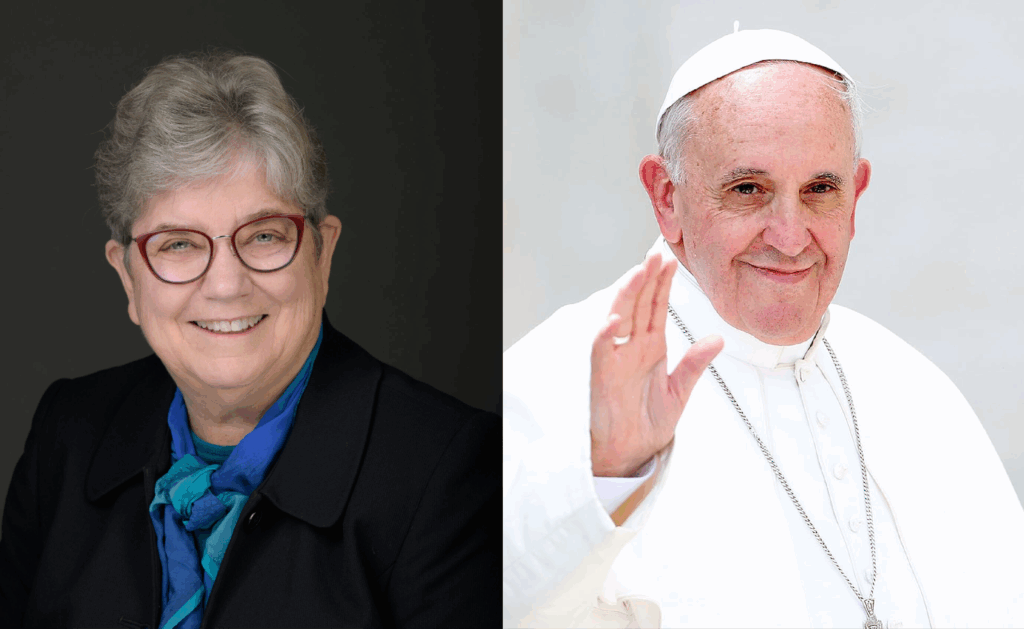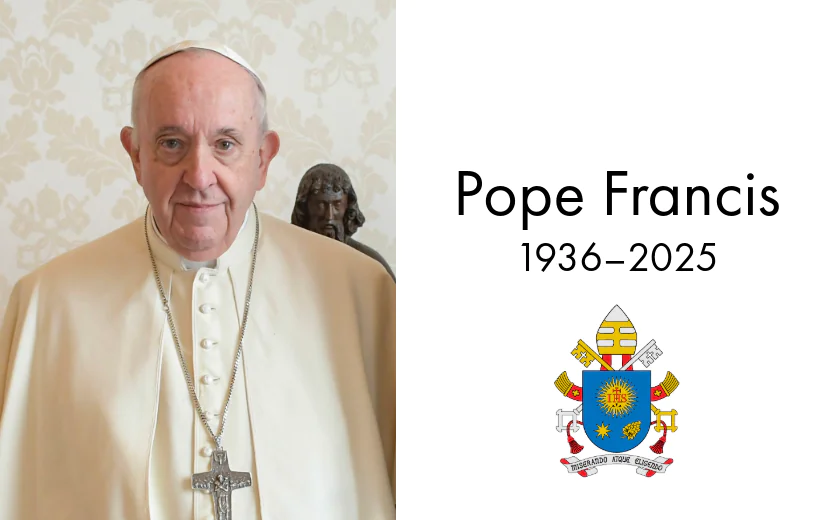The Regis St. Michael’s community joins people of good will everywhere who mourn the passing of Pope Francis (Jorge Mario Bergoglio) (1936-2025), who was Bishop of Rome and head of the Roman Catholic Church from March 13, 2013 to his death April 21, 2025. His unique stamp on the papacy did not stop with the singularity of being the first pope from South America and the first Jesuit to be pope. The changes effected by his papacy marked a new stage in the reception of the vision and reforms of Vatican II in the church’s turn from ecclesio-centrism to it missionary journey to the peripheries of the world to announce the message of God’s saving mercy.
That the reform of the church would be central to his papacy was clear from the moment that Pope Francis announced his name after the papal election in 2013. Christ had told Francis of Assisi, “Repair my Church” and Pope Francis would attempt to do just that. This reform began with his emphasis on the priority of baptism and the call of all Christians to be missionary disciples and consisted in four components: 1) a personal encounter of the mercy of God as a pre-condition of authentic proclamation of the Gospel, 2) the proclamation of the Gospel of salvation through the healing mercy of God, 3) doctrine that serves the pastoral purpose of the church and this proclamation of salvation, and 4) the structural reform of the church required to support the pastoral mission of the church.
While eliciting the love and devotion of the ordinary faithful, his actions at times evoked loathing on the part of some ecclesial elites. Controversy sometimes swirled around him for his emphasis on pastoral discernment by the divorced and remarried in Amoris Laetitia, his insistence that synodality did not just refer to an event in the life of the church, but is an expression of “the church’s nature, her form, style and mission,” and his emphasis on the need for pastoral conversion. While criticizing uncontrolled capitalism and consumerism, he advocated for migrants and refuges, apologized for the church’s complicity in the abuse of Indigenous peoples, and promoted the ecological protection of planet earth. He denounced capital punishment as intrinsically evil. He declared that individuals in same-sex unions, but not the unions themselves, could be blessed outside of liturgical contexts. The more he preached the gospel of mercy and called for conversion, the more he evoked resistance in some quarters.
Pope Francis initiated a number of institutional reforms in the church. One month after his election he formed an international Council of Cardinals to advise him on governance. With the document Praedicate Evangelium (2022) he reformed the structure of the Curia with a focus on evangelization, expanded roles for lay women and men in top leadership positions, and eliminated the previous distinction between congregations and councils, giving them all the title of “dicastery.”
Initiating a financial reform, Francis restructured the way money is managed in the Vatican, expanding the work of Pope Benedict XVI to monitor transactions, standardize budgeting procedures and ensure that the Vatican bank and other financial entities are not being used for illegal activity or money laundering. He established the Council for the Economy in 2014, a group of eight cardinals and bishops and seven lay experts “to consider policies and practices and to prepare and analyze reports on the economic-administrative activities of the Holy See.” He then established the Secretariat for the Economy that reported to the Council for the Economy, and that had authority over economic and administrative activities within the Holy See and Vatican City State, including a review of financial reports.
Pope Francis issued two documents on liturgical reform, Traditionis Custodes (2021), which limits the use of the pre-Vatican II liturgy and thereby adjusts the trajectory on this issue taken by his papal predecessor, and a letter on liturgical formation titled Desiderio desideravi (2022), that reaffirms the reformed liturgy of the Second Vatican Council while at the same time calling for a spiritual renewal with respect to the liturgy. With Spiritus Domini (2021) he opened the instituted ministries of lector and acolyte to both men and women and with Antiquum Ministerium (2021) established a new instituted ministry of catechist, also open to women and men.
His last legacy was the Synod on Synodality, announced on March 7, 2020, and concluded on October 27, 2024. It was the first Synod to use listening circles and discernment as a method of proceeding, to permit lay people, including women, to vote, and for the final document to become part of the ordinary magisterium of the successor of Peter. Hopefully, this legacy will live on in the continued implementation of synodality as the way for the Christian faithful to accompany one another in their journey as a pilgrim church.
Above and beyond any institutional reform of the church, Pope Francis leaves us a legacy of reminding us of God’s abundant mercy and the joy that comes from encountering the Lord daily and living as recipients of that mercy who now extend it to others. Francis’s final social media post the day before he died was “Christ is risen! These words capture the whole meaning of our existence, for we were not made for death but for life.”
Susan K. Wood, SCL
Professor of Systematic Theology
Regis St. Michael’s Faculty of Theology


